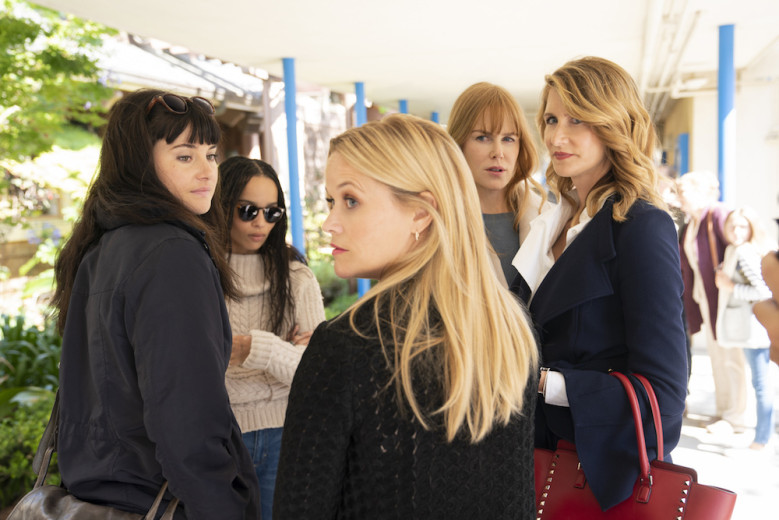One of the most honest, fascinating things about the first season of “Big Little Lies” was how many of its important conversations took place in cars. The Monterey, California painted so carefully by author Liane Moriarty, show creator David E. Kelley, and director Jean-Marc Vallée is a place where “behind closed doors” doesn’t always mean “in private,” where a home is a place a person can be simultaneously hiding something from a child, from a spouse, from themselves. At home, there’s the mother you’re supposed to be, the wife, the friend, the professional, and these women play versions of themselves so well they can forget there’s an act involved at all. Yet sometimes, in the car, they tell the truth. A car is a room so compact that there’s no room for anyone to overhear. It’s a place in which it’s acceptable to be alone. It’s off the grid. It’s a gray area on four wheels.
The moving, blackly funny first season of “Big Little Lies” ended in a space that couldn’t be more removed from the isolated, muffled privacy of a Prius: five women and their children, running free on a breezy, sun-kissed beach, removed from the rest of the world but in community with each other. In the premiere of its second season—which, in the three episodes provided to critics for review, is even funnier and nearly as affecting as the first—that beach seems a distant memory. There’s still plenty of sunshine (captured now by director “American Honey” director Andrea Arnold, ably picking up where Vallée left off), and a connection between the women remains, but in the months since Perry Wright’s death, that peace has withered, and the ghosts have come out to play. So the women now known as the Monterey Five climb back into their cars, look for remote beaches or isolated stretches of road, seeking tiny scraps of privacy, in which, for brief, blessed moments, they can tell the truth.
That might not sound like much fun, but anyone who watched the first season can attest that Kelley, Moriarty, and particularly this incredible cast are more than capable of making room for humor in the darkness. Fan service is a tricky thing—all too easy to write something you know devotees of your show will love, and have it edge past the border of honesty—but Kelley knows exactly how to walk that line, only rarely letting Madeline Martha Mackenzie (Reese Witherspoon, even better this season) reach a level of pointed, angry intensity that seems out of the realm of the real. These may be heightened versions of women—Laura Dern’s Renata Klein is called “Shakespearean,” and more than earns the epithet—but even their most outrageous acts spring from a place that’s entirely human. Kelley isn’t afraid to have fun with that, and Arnold, like Vallée before her, films them meandering around their palatial homes like predators edged up against the glass wall at a zoo. Pain, betrayal, fear, rage, heartache, decades of hurt and terror and guilt and resentment, all bubbling inside these elegant creatures, ready to pour out if pricked with a pin, or worse, if someone dare comes near their young.

While it’s possible in these early episodes to see where Kelley and Moriarty had to pick the stitches sewn at the end of season one to accommodate this unlikely second season, there are enough remarkable distractions—of acting, of direction, of costuming, of music—to make it easy to brush past them and get to the good stuff. It helps when Meryl Streep’s involved. Streep, who joins the cast as Celeste’s (Nicole Kidman) mother-in-law, makes for a seamless addition, once you adjust to the fact that it’s Meryl Streep under that wig and those teeth. Like Kidman, Dern, Witherspoon, and the equally excellent Shailene Woodley and Zoe Kravitz (less underused than last season, mercifully), Streep understands how to root the ridiculous in truth, and how to make even kindness cut like a double-edged sword. Like Alexander Skarsgård, who won an Emmy for his performance as Perry Wright, Streep makes Mary-Louise Wright an oppressive force capable of seemingly genuine warmth—but while Skarsgård always seemed to flip a switch, Streep often allows the compassionate grandmother and the cruel, suspicious creature of grief to blend together. It’s a terrific performance in a sea of them.
It’s difficult to tell where, exactly, this season is headed by the midway point, save for the fact that the end of season one left several landmines undetonated: Ziggy’s (Iain Armitage) curiosity about his father; Madeline’s affair, as yet unknown by her husband (Adam Scott, excellent in these early episodes) but known to her elder daughter (Kathryn Newton); a tenacious detective (Merrin Dungey) unconvinced that the story told about Perry’s death is the truth; the list goes on. Yet had “Big Little Lies” returned without much of a plot, it would still be a pleasure to watch. It looks great, sounds great, and is populated with some of the best actors on a very crowded planet. But as it happens, when you fill your story with characters who are themselves filled with contradictions, old wounds, and long-ignored wants and needs, there’s story to be found. The story of sisterhood—of five women who know enough to put aside petty grievances when it really counts, and who seek in each other the solace of honesty—perhaps most of all. And if they can get a few digs in before and after, so much the better for them, and us.
Three episodes watched for review.












